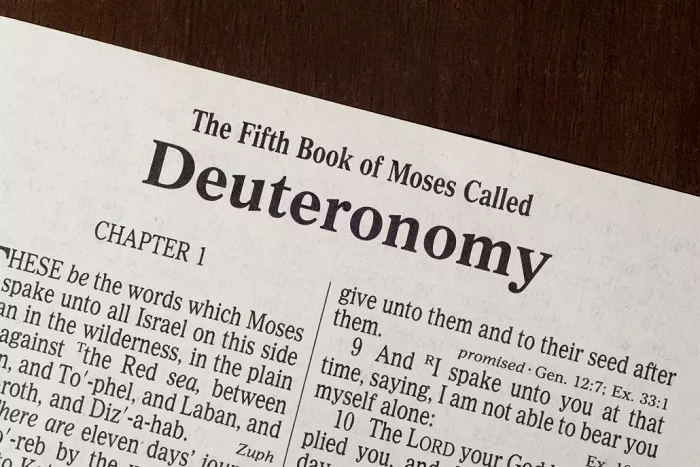The Book of Deuteronomy is the fifth book of the Hebrew Bible and the Christian Old Testament. It is a part of the Torah, the sacred text of Judaism. The authorship of Deuteronomy has been a subject of debate for centuries. This article delves into the complex question of who wrote Deuteronomy. We will examine traditional views, modern scholarship, and internal and external evidence to provide a comprehensive analysis.
Traditional View: Moses as the Author
For many centuries, Jewish and Christian traditions have held that Moses is the author of Deuteronomy. This view is based on several key points:
1. Mosaic Authorship Claim
Deuteronomy itself claims Moses as its author. Deuteronomy 1:1 states, “These are the words Moses spoke to all Israel in the wilderness east of the Jordan.” This explicit claim has led many to attribute the entire book to Moses.
2. Historical Continuity
The book is part of the Pentateuch, which includes Genesis, Exodus, Leviticus, Numbers, and Deuteronomy. Traditionally, Moses is credited with writing these books, providing a continuous narrative from creation to the brink of entering the Promised Land.
3. Divine Inspiration
Moses is depicted as a prophet who received direct revelations from God. This divine inspiration supports the idea that he wrote Deuteronomy under God’s guidance.
4. Jewish Tradition
Ancient Jewish tradition, as preserved in texts like the Talmud, attributes the authorship of the Torah to Moses. This tradition has been influential in shaping Jewish and Christian beliefs about the authorship of Deuteronomy.
See Also: When Did Moses Receive the Ten Commandments?
Challenges to Mosaic Authorship
Despite the traditional view, several challenges have arisen over the years, questioning the Mosaic authorship of Deuteronomy:
1. Anachronisms
Critics argue that Deuteronomy contains anachronisms—events, customs, and terms that did not exist during Moses’ time. For instance, Deuteronomy 34 describes Moses’ death and burial, which Moses could not have written.
2. Third-Person Narrative
The narrative style of Deuteronomy often switches to third-person, referring to Moses in the third person. This narrative shift suggests that another writer may have been involved.
3. Historical Context
Some scholars point to the historical context of the text, noting that it reflects the concerns of a later period, possibly during the reign of King Josiah in the 7th century BCE.
Modern Scholarly Views
Modern biblical scholarship has introduced several theories regarding the authorship of Deuteronomy. These theories often incorporate historical-critical methods to analyze the text. The most prominent theories include:
1. Documentary Hypothesis
This theory suggests that the Pentateuch, including Deuteronomy, is a compilation of multiple sources. These sources, identified as J (Yahwist), E (Elohist), D (Deuteronomist), and P (Priestly), were woven together over centuries. According to this hypothesis, Deuteronomy is primarily the work of the Deuteronomist, who wrote during the 7th century BCE.
2. Deuteronomistic History
Some scholars argue that Deuteronomy is the introduction to a larger work known as the Deuteronomistic History, which includes Joshua, Judges, Samuel, and Kings. This theory posits that a group of writers, influenced by Deuteronomic theology, compiled these books during the Babylonian exile (6th century BCE).
3. Redaction Criticism
This approach examines how the text has been edited and revised over time. It suggests that Deuteronomy underwent multiple stages of editing, with contributions from various authors and editors.
Internal Evidence
Analyzing the internal evidence of Deuteronomy provides further insight into its authorship. Key aspects to consider include:
1. Language and Style
The language and literary style of Deuteronomy differ from other books in the Pentateuch. Scholars note its distinctive legal and sermonic tone, which suggests a different author or editor.
2. Themes and Theology
Deuteronomy emphasizes themes such as covenant, law, and centralization of worship in Jerusalem. These themes align with the religious reforms of King Josiah, hinting at a possible 7th-century BCE composition.
3. Mosaic Speeches
While the book contains speeches attributed to Moses, their style and content reflect later theological developments. This indicates that the speeches may have been composed or edited by later writers.
External Evidence
External evidence includes historical and archaeological findings that shed light on the composition of Deuteronomy. Key considerations are:
1. Ancient Near Eastern Texts
Comparative studies with other ancient Near Eastern texts reveal similarities in legal codes and treaty forms. These parallels suggest that Deuteronomy was influenced by contemporary legal traditions, indicating a later composition date.
2. Historical Context
The historical context of Deuteronomy aligns with the socio-political situation of the 7th century BCE. The centralization of worship and the emphasis on covenant renewal reflect the reforms of King Josiah.
Conclusion
The question of who wrote Deuteronomy is complex and multifaceted. While traditional views attribute the book to Moses, modern scholarship offers alternative perspectives. The Documentary Hypothesis, Deuteronomistic History, and Redaction Criticism provide plausible explanations for the book’s composition. Internal and external evidence further supports the idea of a later authorship.
Ultimately, the authorship of Deuteronomy may never be definitively resolved. However, examining the various theories and evidence deepens our understanding of this important biblical text. Whether written by Moses or later editors, Deuteronomy remains a foundational work in the Hebrew Bible and the Christian Old Testament, reflecting the enduring themes of law, covenant, and faith.


